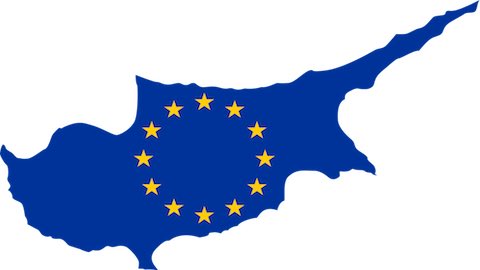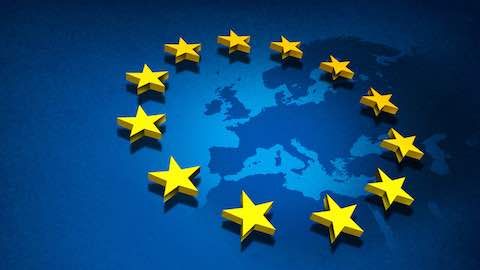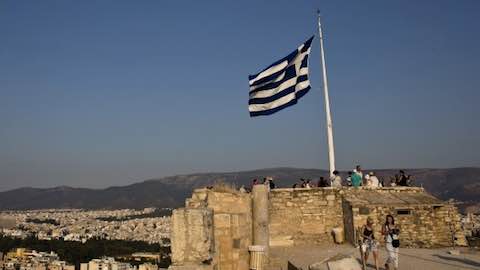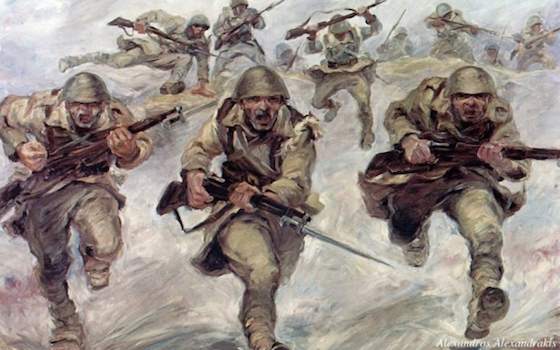- MENU
- HOME
- SEARCH
- WORLD
- MAIN
- AFRICA
- ASIA
- BALKANS
- EUROPE
- LATIN AMERICA
- MIDDLE EAST
- United Kingdom
- United States
- Argentina
- Australia
- Austria
- Benelux
- Brazil
- Canada
- China
- France
- Germany
- Greece
- Hungary
- India
- Indonesia
- Ireland
- Israel
- Italy
- Japan
- Korea
- Mexico
- New Zealand
- Pakistan
- Philippines
- Poland
- Russia
- South Africa
- Spain
- Taiwan
- Turkey
- USA
- BUSINESS
- WEALTH
- STOCKS
- TECH
- HEALTH
- LIFESTYLE
- ENTERTAINMENT
- SPORTS
- RSS
- iHaveNet.com: Greece Current Events
Countries
Argentina | Australia | Austria | Benelux | Brazil | Canada | China | France | Germany | Greece | Hungary | India | Indonesia | Ireland | Israel | Italy | Japan | Korea | Mexico | New Zealand | Pakistan | Philippines | Poland | Russia | South Africa | Spain | Taiwan | Turkey | United Kingdom | United States
- Greek Debt Manageable
- Can Europe Resist the Right Tide?
- Who Feels EU Membership Has Paid Off?
- Euro Zone Borrows From Hedge Funds
- European Prosperity at Risk
- Deals without Borders
- European Hospital Bed Capacity
- Erdogan Warns Europe
- Europe Should Not Freeze Turkey
- The Art of Dissidence & Diplomacy
- The Challenges for Europe
- How Greece's Creditors Trounced Syriza
- Greek Canary in the EU Goldmine
- Greece Bids Farewell to Mitsotakis
- Importance of a Nation's Capital
- Europe is No Longer Safe
- Hollande Warns of American 'Populism'
- EU's Biggest Test Yet
- Greece: EU Sleepwalking Toward Cliff
- A Cemetery of Life Vests
- Illusive Nature of Euroscepticism
- 1 in 6 European Adults Obese
- Solidarity Cities Unite for Refugees
- The Global Militarisation Index
- Euro Zone Economy Steams Ahead
- The Rise of Young Asylum Seekers
- Satisfaction Levels Around Europe
- Ancient Greece's Tower of Winds
- The Rise of Giannis Antetokounmpo
- EU Countries That Deport The Most
- Young Europeans Living with Parents
- If the Far Right has its Way
- The Coming Legacy of Brexit
- Thinking Outside the European Box
- What Really Caused the Crisis?
- Golden Dawn: Fascists at the Gate
- Brexit: What's Next?
- Greece: Echoes of Battles Past
- Greece: What Went Wrong?
- 'A Solution Has to Be Found'
- Greek Leaders Offer Support for Reforms
- Greeks 'Need To Suffer More'
- The European Debt Myth
- Euro Zone Deal Buys Time
-
Greece Rejects EU Austerity
- Why Syriza Scares EU Leaders
- Lagarde: Greece Must Honor Commitments
- Greek Bailout & Unanswered Questions
- Determined to Thwart ISIL Gunrunners
- 13 Confirmed Dead in Ferry Fire
- Greece Puts Crisis In Past
- The Stagnant Mediterranean
- China & Investors Bet on Greece
- Germany's Selective Memory
-
Tsipras to Sell Austerity Deal to Reluctant Party
- Does Germany Trust Greece?
- The Cynic's Take on Greece
- Tough Greek Reforms Face Parliament
- Greek Banks Face Closure Regardless
- Europe's Geopolitics
- Battling EU Austerity
- The Intersection of 3 Crises
- Can Central Bankers Save Europe?
- Greece's Situation Really Bad
- Tsipras Calls for Change
- How Greece Affects Economic Trends
- Leaving Athens for a Better Life
- Greece to Rejuvenate Privatization Effort
- Costa Rica Downs Greece on PKs
- Have Greek Markets Turned a Corner?
- Europe: The Social Immune System
- Greece Races to Finalize Reform Proposals
- No Blank Check for Greece
- Syriza: The Greek Earthquake
- Dying to Get Into Europe (Part 1)
- Dying to Get Into Europe (Part 2)
- The Crisis of Europe
- Europe Going the Way of Yugoslavia
- Greeks Divided Over Syriza Win
- Thousands Celebrate Syriza Victory
- Syriza Seeks Talks with Right
- Will Greece Turn to the Radical Left?
- Will Greece Leave the Eurozone?
- Greece to Develop Former Airport Site
- The Right Rises Again
- Europe, Unemployment and Instability
- The Politics of Fear
-
Coverage, analysis, photo and video coverage of the 2014 FIFA World Cup from Brazil
-
Check out the photos from the Round of 16 matchup between Costa Rica and Greece at the 2014 FIFA World Cup in Brazil - Costa Rica vs Greece Pictures
-
Check out the photos from the Group C matchup between Greece and Ivory Coast at the 2014 FIFA World Cup in Brazil - Greece vs Ivory Coast Pictures
-
Check out the photos from the Group C matchup betweenJapan and Greece at the 2014 FIFA World Cup in Brazil
-
Check out the photos from the Group C matchup between Colombia and Greece at the 2014 FIFA World Cup in Brazil
-
Colombia marked their return to the World Cup after a 16-year absence with an attacking display that earned a 3-0 victory over Greece on Saturday (June 14), and the early initiative in what looks to be a really tight Group C
-
Ten years after stunning the world by winning the UEFA Euro 2004 championship, and 20 years after its inauspicious World Cup debut, Greece is back on soccer's biggest stage. Pundits say Greece could advance past the group stage for the first time
-
Sports Illustrated's Grant Wahl preview Group C for the 2014 World Cup in Brazil and picks his teams and players to watch once play begins.
-
Germany's Chancellor Angela Merkel says that the answer to Europe Union's problems is more political integration. But, one is left asking what closer political union can bring to the EU without a full transfer of national sovereignties to European institutions
-
It is not simply the euro zone that is threatened by the dramatic economic discrepancies that now exist among its members. Now it is the European Union itself that is in danger, mainly but not entirely because of the economic crisis inherited from Wall Street abuses
-
Although Greece's government has said it will not ban the neo-Nazi Golden Dawn party, the Council of Europe's commissioner for human rights said there is enough evidence of the party's support for violence to outlaw the group
-
With urban cemeteries filling so fast that bodies are dug up after three years and put in ossuaries so plots can be reused, Greece gave approval for cremation in 2006. However, no one has been able to get past opposition from the church
-
The ongoing economic crisis that has dropped hotel rates and food prices made Greece one of the most attractive destinations for tourists this year. Tourism revenues could hit record highs of as much as 12 billion euros this year
-
When the proposal was initially made for a common European currency, it seemed to be a good idea. Although inexpert in economics, it struck me as an effect of a false analogy with the United States that was common in Europe at that time
-
Many Greeks are welcoming an announcement that further austerity measures to repay Greece's overwhelming debt will not be sought following three years of pay cuts, tax increases and slashed pensions. Prime Minister Antonis Samaras said better times are ahead
-
Police officers in body armour surround dark-skinned men on a busy street in Athens. It is a scene that has been playing out across the city since the government crackdown on illegal migration
-
Seventeen economically disparate nations bound their fortunes together in creating the euro zone, and it is exactly this that has thrown the European project into crisis
-
The European Union has voiced concern about low fertility as a major demographic challenge. If it stays at these low levels, the population quickly moves from growth to decline, which is already happening in Germany, despite immigration
-
The latest labor market report continued to show a wide disparity in the jobless rates throughout the eurozone. More than a quarter of the workforce is unemployed in both Spain and Greece, while in Germany only 5.4 percent are out of work
-
Why do once-successful societies ossify and decline? Hundreds of reasons have been adduced for the fall of nations and empires. Reasons run from inflation and excessive spending to resource depletion and enemy invasion, as historians attempt to understand the sudden collapses
-
History is not an alibi, but neither is ignorance or indifference to history, from which Germany has richly profited since 1948. Greece was less fortunate
-
We live within an economic system that is cruel and impersonal, divorced from gratitude, empathy, compassion, love and nurturance
-
The ongoing economic crisis in Greece and a surge of the neo-Nazi group Golden Dawn has targeted immigrants
-
International auditors are set to arrive in Greece to determine if the struggling country is eligible to receive $38 billion in aid
-
Two Greek athletes were sent back from London after one tested positive for a banned steroid and the other made a racist remark on Twitter
-
Significantly reduced funds for training and equipment have diminished medal hopes for Greece
-
Nearly every step towards total union has revealed still more of the inherent factors of disunity in Europe and has dramatized how distant 'Europe' has become from the simple and lucid ambitions of its origins
-
The European Union is at risk of being destroyed by the euro. The credit crisis has created divisions in Europe which are undermining what was supposed to be mutual confidence and solidarity
-
Antonis Samaras gets his technocrat-laden cabinet working on the Greek economic crisis while he handles the politics
-
Other countries have problems, but Greece's are an encyclopedia of bad behavior
-
Conservative leader Antonis Samaras takes the helm of the new Greek government, but faces political -- and popular -- opposition
-
Driven by fear of being pushed out of the eurozone, Greeks back the same parties who created their economic crisis
-
Throughout the Euro crisis, the Euro elite has suffered from the same inability to imagine failure that led to August 1914. Even days before the outbreak of war, it was thought impossible because the consequences would end the system
-
If the eurozone splinters, it will have been an avoidable disaster. The choice lies with Germany, which can save the monetary union if it allows for policies aimed at debt relief and growth, not just slashing deficits
-
Czech Republic and Greece posted crucial victories to advance to the quarterfinal stage of the European Championship 2012. The Czechs defeated Poland, 1-0 while Greece beat Russia, 1-0
-
Athens' Independence Day parade turned into a private event for political leaders due to worries of anti-austerity demonstrations
-
Greece's economy has suffered from both the financial crisis and austerity measures meant to resolve the crisis
-
Europe's new fiscal compact treaty attempts to force regional reform without challenging sovereignty
-
For all the veneer of the 21st century, the world still looks a lot like it did during the last hundred years and well before that
-
Greeks breathe a sigh of relief now, but economists say a day of reckoning still looms
-
In Greece, opinion is that once again, as in 1917, 1940 and 1947, when, as they are convinced, they were ill-used by the great Western powers, they once again are victims of Western Europe, and especially of Germany
-
The old foes -- who are now EU allies -- are bickering over who is to blame for Greece's economic crisis
-
Greeks around the world are undertaking public relations initiatives to re-establish their homeland's reputation, as well as to boost the morale of its people and confidence in its economy
-
An EU court ruling says Greece is too risky for asylum seekers to be returned, but what can the country do when so many want to come in -- and get out?
-
2012 could be the make-or-break moment for the embattled eurozone. Europe could either continue on the path of ever-greater integration - or return to being a regional group of rival states.
-
The euro should now be recognized as an experiment that failed. The political goal of creating a harmonious Europe has also failed
-
The discovery of large quantities of natural gas offshore Cyprus could give a push for ending the decades-long dispute dividing the island. But it could also end up ratcheting up tensions with Turkey
-
Everyone is wondering about the next disaster to befall Europe. Italy is one focus; Spain is also a possibility. But these crises are already under way. Instead, the next crisis will be political, not in the sense of what conventional politician is going to become prime minister, but in the deeper sense of whether Europe's political elite can retain power
-
Banker and academician Lucas Papademos gets the unenviable task of keeping Greece's teetering economy afloat and dealing with more protests and strikes over austerity measures.
-
With no end in sight for the two-year-old euro crisis, the question now is can the EU survive it while remaining united?
-
Minorities throughout the Balkans are banding together and drafting constitutional type documents aimed at protecting and serving their rights
-
Delivering a plea to keep international aid coming -- and a blistering attack on his rivals -- Greek Prime Minister George Papandreou survived a close vote of confidence
-
Greek Prime Minister George Papandreou agreed to make way for a negotiated coalition government, raising hopes for a political consensus on the EU bailout and austerity measures
-
Degrees in hand but no jobs and few prospects, many of Greece's young say they'll reluctantly abandon their near-bankrupt country and look for work and a new life in other countries. Others are just resigned
-
European Union leaders have brokered a deal to reduce Greece's debt and hopefully stem the continent's lingering debt crisis. The deal is a major move forward, but it is still only one step in restoring stability on a continent beset by economic woes
-
The new leader must hold together a fractured political system and convince Greeks that more pay cuts and tax hikes to get loans are needed to save their country
-
For Greeks, October 28th is a revered day -- the anniversary of a 1940 response to Mussolini's demand that Greece surrender without a fight during World War II. But this year, Greeks are standing up to their government against what they perceive as sacrificing the country's sovereignty to foreign lenders
-
Greece will write off 50% of its new debt, but workers, pensioners and the poor say it won't help them in the aftermath of pay cuts, tax hikes, slashed benefits and thousands of coming layoffs
-
The financial crisis had its greatest impact in Europe, where it is triggering a generational shift. Since 1991, the idea of an integrated Europe has been a driving force of the global economy. Europe also has been presented as an implicit alternative to the United States as the global center of gravity
-
Ten-man Greece held Japan to a 0-0 draw that ended with boos ringing around the arena. Greece is the happier after playing for 52 minutes without Kostas Katsouranis, who was sent off for two yellow card offenses
-
Giorgos Samaras' stoppage-time PK in the 93rd minute gave Greece a dramatic 2-1 victory over Ivory Coast in their final Group C match and advanced the Greeks through to the Knockout Stage of the World Cup for the first time
-
The outcome of the recently concluded European Parliament elections is described as a shock or crisis, but the actual reaction is better named hysteria, as if the rise of the right in these elections resembles the rise of fascism in the 1930s
-
While Tea Party candidates underperformed against establishment Republican incumbents in recent U.S. primary elections, in Europe their conservative cousins have just scored some spectacular victories
-
Just a week before the World Cup begins, the Greek soccer team continued their preparation, as part of the Road to Brazil series. They took to the field at the Red Bull Arena, just a day before their friendly match against Bolivia
-
I keep getting asked if Greece is safe for travelers -- a question that feels absurd the instant you arrive there. Safety concerns have been played up by the international media outlets. Frankly, it's a great time to travel to Greece
-
The euro crisis is now threatening to turn the European Union into something fundamentally different. The member countries are divided into two classes -- creditors and debtors -- with the creditors in charge
-
They gather on benches, and some even kick a ball around, but they are not here for recreation - this is where they sleep, hoping their numbers will provide some protection
-
I am not writing this to pile on two Harvard economists who put the Western world into economic mess. I am concerned about the policy professionals who accept such economic propositions even when they seem self-evidently too good to be true and defy common sense
-
With unemployment in Greece at 27 percent, it is not surprising to see both radical right- and left-wing groups gaining support from those who have become disaffected by the crises. The disenchanted are joining radical parties espousing a wide variety of ideologies
-
Emerging extremist organisations in the Balkans are operating alongside existing extremist groups and may try to change the political and legal framework to fit their agendas
-
When Vahid Pejman, a former journalist from Afghanistan, arrived in Greece with his wife and 11-year-old daughter, he anticipated a brief stay before heading somewhere more welcoming
-
The Nobel Committee recently awarded its prestigious top prize to 500 million people who have, for the last 65 years, made a conscious decision to live together in peace and harmony: the European Union
-
With Germany enjoying historic lows in unemployment, why is she resisting calls to open her purse strings to help the eurozone's floundering members? It is worth examining why Germans see things differently
-
Prime Minister Antonis Samaras told Greece's parliament he will adhere to harsh austerity measures demanded by international lenders, in the hope that will lead to renegotiations
-
Greek officials and businesses are trying to lure back reluctant visitors, amid worries the 2012 tourist season is lost
-
The recent indecisive Greek elections could be summed up by two general themes: Greeks want to stay in, and expect help from, the eurozone
-
It's no accident that Greece is the most economically troubled country in the EU. The fact that it is located at Europe's southeastern back door also has something to do with it. For Greece's economic and political development bear marks of a legacy not wholly in the modern West
-
Energy exploration is adding a new wrinkle to the Turkish-Greek rivalry over the island of Cyprus
-
A spike in suicides is blamed on the economic crisis that could also bring down the country
-
With an 18 billion-euro bailout, Greek banks are now staying afloat. But losses and political instability could easily sink the ship
-
The Balkans are historically apart from Europe for two reasons. This has everything to do with the present crisis of Greece and the future of Greece's membership in -- or perhaps its departure from -- the European Union and its euro zone
-
All over Europe, the gospel is that tight-fisted Germans are at the root of the European Union meltdown: They worked too hard, saved too much, bought too little and borrowed not at all
-
The elections in France and Greece seem widely to have been taken, at least on the European and American left, as a solution to the great European economic crisis
-
Corruption is a way of life in Greece, and even the raging economic crisis cannot stop it
-
Two renowned figures suggest that Greek Cyprus' presidency of the EU is an opportunity to correct nearly 40 years of history -- the reunification of Cyprus for the first time since the Turkish invasion of 1974
-
Elections in Greece and France may be further dividing the Continent
-
Economists continue inveighing against austerity strategies. But none of them seem capable of explaining in plain, simple language why imposing austerity now is utterly foolhardy -- in fact, just plain stupid
-
Voters in France and Greece proved that they're willing to cycle through governments over and over until someone fixes their predicament. They want Santa Claus, as if they were 5 years old again
-
Enraged Greek voters delivered a stinging rebuke to the two ruling parties that have dominated politics for four decades
-
Political leaders stick to their scripts amid anger over austerity, uncertainty and the rising right-wing groups
-
Over the past two years, the eurozone members have done a remarkable job managing the short-term symptoms of the crisis, although the costs have been great. Yet the long-term challenge remains
-
Bribery as a way of life in Greece has undermined the country, but attitudes may be changing
-
Mykonos is the classic Greek-island stop and, along with Santorini, it's the most touristy. But being on Mykonos recently reminded me how enduringly charming the Greek islands are
-
Even before the financial sector and sovereign debt crisis began to destabilise Europe's banking system, European leaders were voicing fears that the Old World might be slipping towards global irrelevance
-
Increasingly, the European debt crisis is ceasing to be a Greek or Italian crisis. It is a crisis in the future role Germany will play in Europe
-
At the heart of this particular crisis is the unpleasant fact that the common European currency project is, in its present form, simply not working
-
This time exactly 10 years ago, in December 2001, Argentina was sinking under the weight of its debts and hardly anyone was watching. In Argentina, you could feel the relentless slide towards catastrophe
-
The stage is set for the 2012 Euro Cup following Friday's draw that saw host Poland and Ukraine getting the top draws while Spain placed in a tougher group. Poland was drawn in Group A along with Greece, Russia, and Czech Republic
-
The small right-wing LAOS party, often accused of extremism, joined Greece's ruling coalition
-
What made Europe a compelling political, economic, and social alternative wedged between Anglo-American free marketeers and Soviet nomenklatura is rapidly becoming a thing of the past
-
Comparing past sovereign restructurings, William R. Cline, a senior fellow at the Peterson Institute for International Economics, says that Uruguay's orderly default in 2003 offers a constructive example for Greece. The tentative Greek plan is similar to the path Uruguay
-
Only the United States seems to have an affinity for protecting tiny, vulnerable countries. Israelis, anti-communist Chinese, Kurds, Greeks and Armenians have a few things in common. They have relatively small populations, aggressive neighbors, few strong allies, many expatriates and refugees in the United States, and a tragic history of persecution and genocide
-
Senior banker Lucas Papademos was named to be the new prime minister of an interim Greek unity government that seeks to agree upon a new European debt deal and thwart national bankruptcy for the financially ailing country
-
EU leaders announced a new plan to contain the debt crisis in the euro area, after private banks and investors agreed to write off 50% of Greek debt from their books
-
The crisis won't be over until the underlying flaw of the euro is fixed -- namely the separation of monetary and fiscal policy. German public opinion has to realise that the euro was built on imperfect foundations and that these imperfections must be corrected. Meanwhile, the Italian president of the ECB will need all his technical and political expertise to keep the Eurozone together
-
It was short-term good news in that it defused 'the bomb' -- the possible catastrophe vortex of failing banks and defaulting sovereigns. The bad news is that it will induce a recession. Banks will create a credit crunch in trying to meet capital adequacy ratios, and the new austerity will create a fiscal contraction
-
While Greece is at the epicenter of the troubles right now, the economic effects of the European Union crisis could be profound and global
-
In Greek mythology, the prophetess Cassandra was doomed both to tell the truth and to be ignored. Our modern version is a bankrupt Greece that we seem to discount
-
The dominant view has been that the Greek debt is the creation of a clientelistic political system that has historically resulted in a bloated public sector, unable to collect taxes. This is not a serious view
-
The lack of paid maintenance and heating fees in urban apartment communities is leaving some tenants out in the cold
-
A country roiling in an economic crisis, strikes, protests and riots is fertile territory for blogs, but a move is afoot to undermine them, critics say
-
Soccer in Greece is quickly losing its fan base amid scandals and stadium violence
-
We may be looking at the possibility of a worldwide financial meltdown
-
Conventional wisdom has it that the eurozone cannot have a monetary union without also having a fiscal union. Euro-enthusiasts see the single currency as the first steppingstone toward a broader economic union, which is their dream. Euroskeptics do, too, but they see that endgame as hell -- and would prefer the single currency to be dismantled
-
As Greeks marched to protest more austerity, the government said is critical to save the country from going under
-
By showing us the possibility of democracy in revolution, the Mediterranean has ignited a revolution in democracy, one that is redefining the meaning of both terms
-
France, like all of Europe, is caught in an economic tsunami, and France is teetering at the edge of the precipice. Every week, it seems, presidents and prime ministers hold urgent meetings searching for a solution, culminating with the G-20 convocation recently. Still, the problem grows only worse
© iHaveNet.com







